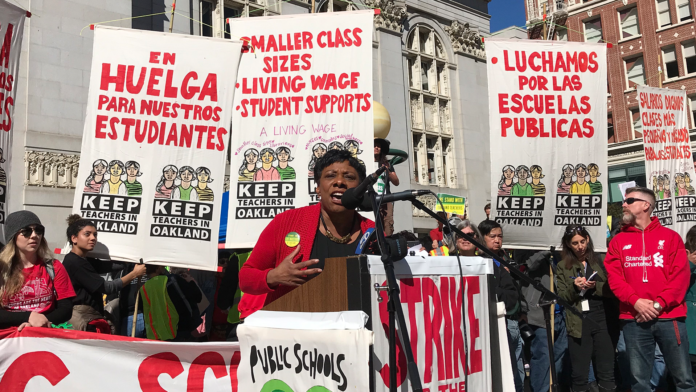
From racial disparities in school funding and the school-to-prison pipeline to segregated schools and efforts to ban the teaching of Black history, there are plenty of challenges in public education that negatively impact the educational experiences of Black children.
But there are also those warriors who believe educational equity is a civil rights and social justice issue. These folks show up every day and work to dismantle the disparities that plague our schools — disparities that disproportionately affect Black and Brown students and those from low-income families.
Randi Weingarten, the president of the 1.75 million-member American Federation of Teachers, is one of those warriors. Her bio on X, formerly known as Twitter, sums up who she is and what she’s about: “Fighting 4 kids & communities, democracy, public ed & healthcare & freedom 4 all.”
It’s no surprise then that in late May, Weingarten, who is a life member of the NAACP, was appointed to the organization’s National Board of Directors. The board governs the organization, sets policies, and oversees initiatives aimed at advancing civil rights and eliminating racial discrimination.
NAACP President and CEO Derrick Johnson celebrated her appointment, noting in a statement that the AFT and NAACP have long been collaborators and “Weingarten’s unique perspective and visionary leadership will be an invaluable contribution to our work advancing civil rights and creating a more just and equitable society for all.”
Her track record in doing this work could explain why, in November 2022, Mike Pompeo,

former C.I.A. director and secretary of state in the Trump administration, told Semafor, “The most dangerous person in the world is Randi Weingarten.”
Jose Vilson, CEO of the education advocacy group Educolor, says Weingarten has been a fierce advocate for public schools and specifically serves so many Black communities, so a seat with the NAACP is only right.
“You would want the head of the teachers union that happens to represent some of your Blackest cities to actually have a seat there at the NAACP,” Vilson says. “From a number of perspectives, but from a Black perspective, it would inevitably benefit everybody involved just because you want to ensure that education is one of the pillars that we do keep working on.”
Bringing Union Values to the NAACP Board
Weingarten firmly believes we get closer to racial equity and justice through a strong labor movement, quality public education, and the sacred right to vote. “That’s how you get equal opportunity,” Weingarten tells Word In Black.
“Part of my job on the board is not just to talk about lived experience, but how do we strengthen public schools? How do we make sure every public school is pleasant and parents want to send their kids and educators who want to work?” Weingarten says. “How do we make sure that the lived experience of Black teachers is present in school? How do we make sure that we do things to make sure that discrimination is a thing of the past?”
Achieving these things can’t be done alone. In a recent column, Weingarten explained that “perhaps the strongest argument for unions and collective action is also the simplest: Individuals seeking change can be powerless alone; together, we can tilt the balance of power so working people can demand — and forge — a path to a better life. That’s the American dream.”
Vilson tells Word In Black that the NAACP has made schools take accountability for how they show up for their students across the country, but with Weingarten on board, it creates a deeper connection to what our Black teachers are going through on a day-to-day basis.
“Having Randi on the board for NAACP means that we’re going to be having a bigger conversation about the lived experiences of Black teachers, and particularly those who have been activated within more unionized spaces,” Vilson says. “They often end up being the forebears of any sort of real organizing when it comes to education — Black teachers do occupy that role, and it’s not to say they don’t do it outside of the union structure, but some of the most activated teachers out there are also unionized, and that matters a lot too.”
Reclaiming the American Dream
Through her work with the NAACP, Weingarten hopes to restore faith in the American Dream by ensuring people’s aspirations, like becoming president or a business mogul, are attainable. By fostering conversations about teacher retention and student development, Weingarten also aims to revive the energy and sense of possibility that existed at the start of the Obama administration.
“In 2008, there was a sense of optimism, even though we were in a terrible recession — there was a sense of optimism with Barack Obama’s election,” she says.
At the same time, she’s aware some Americans were disappointed that “Obama didn’t have a magic wand that couldn’t just make all these things better like if we were in Disneyland, so part of our job is to actually be honest and transparent about this journey.”
But optimism can only take folks so far down the path of racial and social justice and educational equity if they don’t head to the polls, especially in a presidential election year.
“The vote is the beginning,” Weingarten says. “We have to fight for those things to happen. One person can’t do it alone.”



